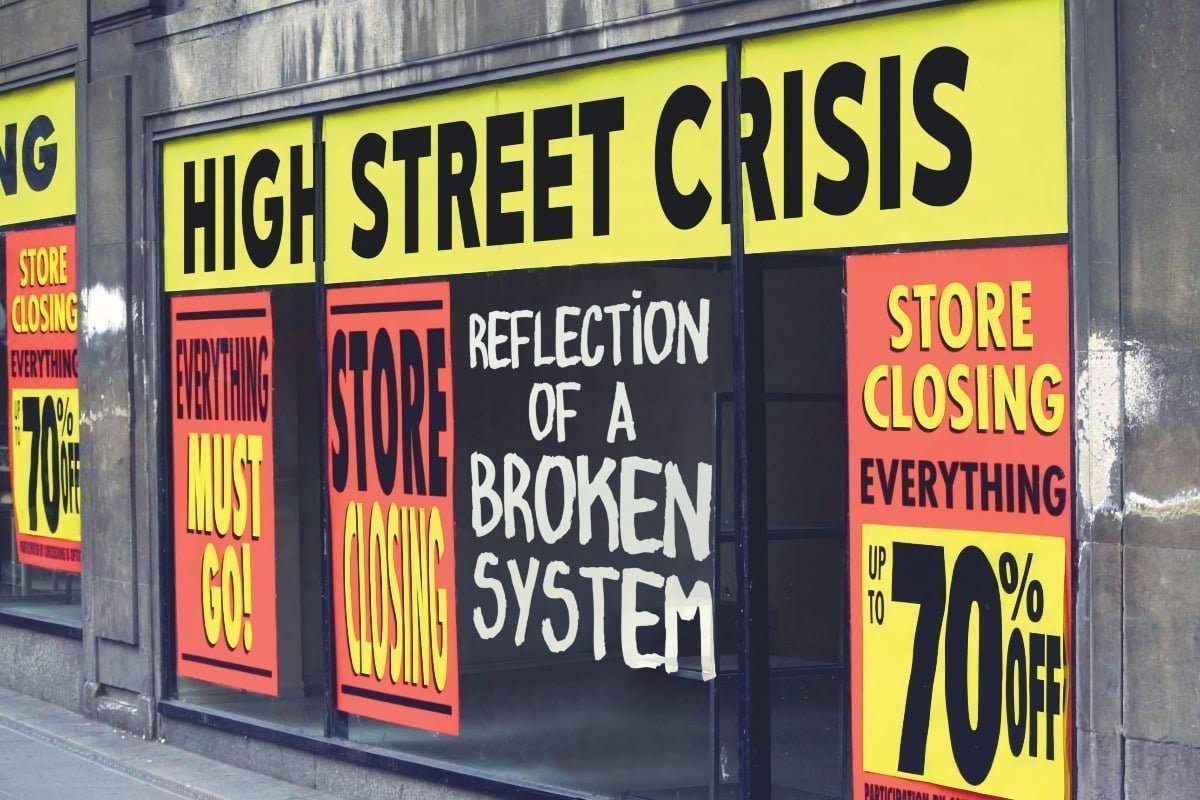Today marks the first day of trading for many shops after months of closure. But many will not reopen. Capitalism’s race to the bottom had destroyed Britain’s high streets. Now the crisis is accelerating.
Lockdown restrictions on non-essential retail shops in England are to be lifted from today. The Tories are no doubt hoping that doing this will help economic activity return to ‘normal’.
But in reality, there will be no going back to ‘normality’. Economists with more far-sighted perspectives than the Tories (which is not saying much) warn that Britain is facing the greatest economic crisis in its entire history.
Earlier this year, before the pandemic and resulting lockdown, bricks-and-mortar retail businesses were already struggling. For many, this lockdown will prove to be less of a hibernation and more of a terminal illness.
Bankrupt
When comparing the amount of retail sales in April vs those in March of this year, we find a fall of 18%. This is the largest drop ever recorded, and second only to the one observed the previous month, which was 5.2%. This has translated to an estimated loss of £1.8bn in sales.
U.K. retail sales fall by a record 18% in April, clothing sales slump 50%
https://t.co/j0VAAstdsT— Stanley Suen (@stanleysuen) May 22, 2020
Even before the pandemic, we saw several big-name stores such as Debenhams, House of Fraser, Toys-R-Us, Mothercare, and many more go into administration. Even bigger, more successful chains, such as Tesco and Boots, have had to close hundreds of stores.
Research by The Centre for Retail found that 16,000 stores closed in 2019, with the loss of 140,000 jobs. These grim figures are from before stores were forced to close for months due to the pandemic!
The threat posed to all retail workers is very clear. But we must ask: how did we get here, and what is the solution?
Market logic
 The situation facing retail chains may appear to be ‘accidental’, or simply the product of bad business decisions and changing consumer attitudes. But this is only half of the story.
The situation facing retail chains may appear to be ‘accidental’, or simply the product of bad business decisions and changing consumer attitudes. But this is only half of the story.
The other half – which you will not be told by the billionaire-owned press – is that capitalism tends towards the concentration of capital into a small handful of massive monopoly companies. This is as firms that fail leave behind assets which can be acquired on the cheap by larger, more profitable firms.
This process can be best seen now, as the deepening crisis of the high street is occurring alongside massively increasing profits for Amazon. This is at the point where it appears that Jeff Bezos, already the richest capitalist on Earth, might also become its first trillionaire.
Smaller firms – to say nothing of independent local retailers – are squeezed by competition from these mega-companies on the one hand, and from rent demanded by landlords on the other. Throw in the falling purchasing power of consumers due to unemployment, stagnating wages, rising living costs, and accumulating debt, and you can see the culpability of the capitalist system itself in the decline of the high street.
And as these stores struggle to remain afloat in the coming economic storm, it will be the workers employed in them who will no doubt be asked to take the hit, once again.
Fightback
Trade unions that represent retail workers – especially the Union of Shop, Distributive and Allied Workers (USDAW) – should undertake a massive recruitment drive to organise workers in threatened stores. They must demand that jobs, pensions and wages are not cut to preserve the profits of the bosses.
“But what about businesses who cannot afford not to make cuts?”, the bosses will no doubt say in response. To this we would answer: let the organised workers see the books! Then we can see for sure what these businesses can and cannot ‘afford’.
In the case where a business is indeed unable to sustain the continued employment of its workers at reasonable hours and decent pay, then we say, “this business has failed at being a business”. We must call for these to be nationalised, under the control of its workers, with no loss of pay.
Of course we would neither expect nor trust Johnson and his Tories to deliver any of this. No, to do this, we would need a socialist government – one prepared to break with the sacrosanct, yet discredited, institutions of private property and production for profit. Such a government could integrate these stores into a democratically decided economic plan of production for need.
We are going into the greatest crisis of capitalism since the Great Depression, if not greater. No sector will be unaffected. The ruling class will attempt to make us pay for their crisis. The fightback must begin now.






